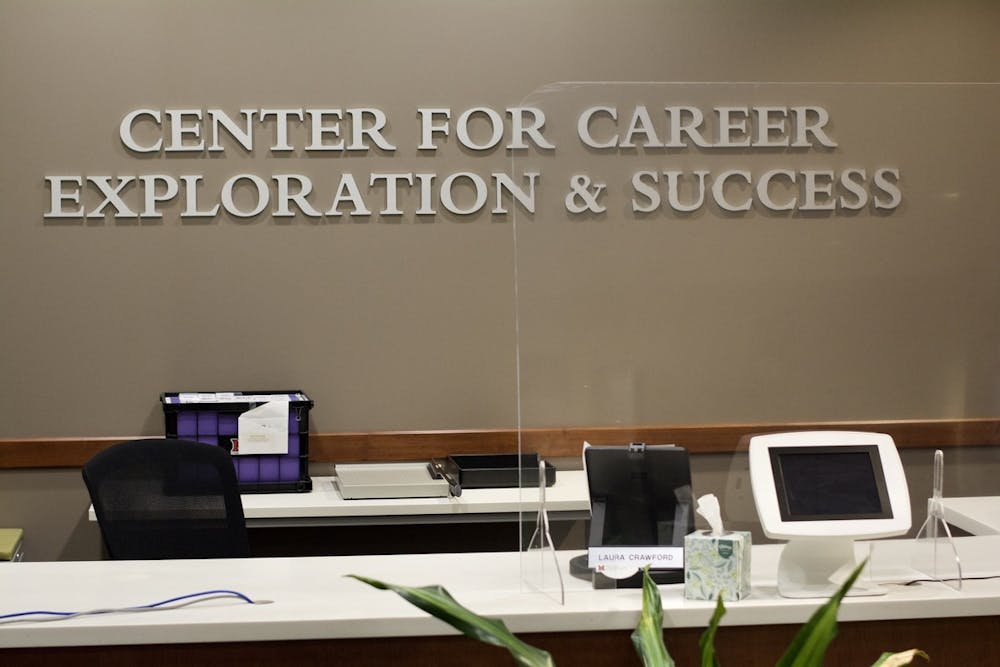For most university students, the start of the spring semester signals the beginning of classes and a fresh start both academically and mentally. However, for many college seniors, it puts the end of the school year into an all-too-clear focus. The question of employment and education after college becomes more pressing every day.
Though this has always been stressful, the COVID-19 pandemic has transformed the job search into a truly daunting task.
Logan Fry, a senior political science major, will be graduating this May. On an average day, he wakes up, grabs his computer and plumbs the depths of Linkedin, Indeed and Handshake in an attempt to find a job opening that suits him.
“The job market is awful right now,” Fry said. “People are getting laid off, so you have a bigger group of people looking for jobs. Even finding a job opportunity out there is hard — many companies are focusing on retaining what they have now and not expanding.”
Fry also expressed some frustration with the companies that were offering jobs.
“I’ve gotten a single no and have been ghosted by everybody else that I’ve applied for,” he said. “At this point, there’s not much certainty for a future job at all.”
Sydney Herrick, a senior art history major, decided to try to find a museum-related job after graduating instead of immediately going to graduate school.
“I don’t want to go to grad school if it’s not hands-on or giving me a chance to intimately work on projects with a small group,” Herrick said.“I don’t feel comfortable paying for virtual grad school.”
While she has a few pending job applications, Herrick is still looking for as many job opportunities as possible. She frequently checks sites like Linkedin on her phone for any new job offers and constantly checks museum websites to see if there are new openings for employee or intern positions.
Like Fry, she felt the pandemic brought new challenges to the job searching process.
“The issue is that most museums are not open, and if they are, they aren’t looking for new employees because they aren’t making as much money,” she said. “There’s less opportunity right now, and I have had to look at aspects of museum work other than curatorial positions.”
Brooke Bennington is a senior triple majoring in media and culture, sociology and strategic communications. Unlike Herrick, she decided to apply to graduate schools for the fall instead of waiting. Her application process involved creating a CV (essentially a resume for graduate school), formulating a writing sample of 15-20 pages and drafting personal statements. While she was not applying for a conventional job, Bennington still faced additional challenges from COVID-19.
Enjoy what you're reading?
Signup for our newsletter
“My research paper that was supposed to get published was canceled when the pandemic started, so I don’t have it on my resume,” she said.
While the pandemic has created uncertainty surrounding the futures of these students, it did provide a silver lining that benefited each of them in some small yet positive ways.
“In the grand scheme of things, having this new virtual aspect for some jobs can make it easier for some people searching because you don’t have to worry about moving to new places if the job is virtual,” Fry said.
Bennington also found some solace in the less-involved application process.
“Most schools didn’t have the manpower to run interviews, so for me, as an introvert, it’s easier,” she said. “Grad schools are also being more lax this year, so the GRE (graduate record examinations) is not required for many of them.”
The quarantine and lockdown measures also eased the burden of job searching for students like Herrick.
“I had nothing to do this break, so I was more focused on applying and writing cover letters and stuff,” she said. “I wasn’t going out with friends, shopping or going downtown. It gave me some free time to search for a job.”
Despite these benefits, the job market is still drastically changed by the pandemic, and it has led to huge amounts of uncertainty and stress. While students like Fry, Herrick and Bennington were able to use connections, technology and professors to look for jobs, their overall thoughts on the job search during the era of COVID-19 were clear.
“I’m worried that school will be all online, and I’ll move to a new city alone,” Bennington said.
“It’s very stressful because I have the upcoming deadline of May 15, so I don’t want a lull between graduation and starting a job,” Fry added.
“Everyone had it in their brains that they were going to have this direct path after graduation and COVID ran over it with an 18-wheeler,” Herrick said.




